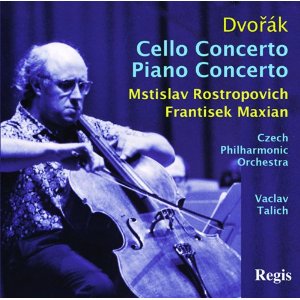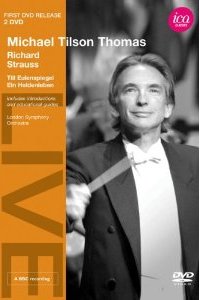Classical CDs Weekly: Beethoven, Dvořák, Strauss | reviews, news & interviews
Classical CDs Weekly: Beethoven, Dvořák, Strauss
Classical CDs Weekly: Beethoven, Dvořák, Strauss
Period symphonies, mono Rostropovich and virtuoso LSO (in Eighties knitwear)
This week we’ve a brilliant, budget-priced box of Beethoven symphonies played on authentic instruments. It’ll remind you of how much fun there is to be had with this most iconic of composers. A historical recording of a famous cellist reappears, but the best reason to listen to the disc is to hear a famous Czech conductor achieving miracles. And there’s an entertaining, educative DVD featuring a conductor who’s in his element when addressing an audience.
 Beethoven: Complete Symphonies La Chambre Philharmonique/Krivine (Naïve)
Beethoven: Complete Symphonies La Chambre Philharmonique/Krivine (Naïve)
Beethoven symphonies played on modern instruments feel more and more anachronistic today, certainly in terms of recordings released. And when non-period orchestras play these works, being "historically informed" is the norm: you expect swift speeds, minimal vibrato and plenty of drama, as with recent cycles by the likes of Zinman and Norrington. Emmanuel Krivine’s set, recorded live at concerts given in Grenoble, Caen and Paris in 2009, is spectacular – largely because whilst listening you’re convinced that what you’re hearing is the only way that this music should ever sound. The effect is uproarious, occasionally shocking and consistently exhilarating. The orchestral sound is inevitably sparer, thinner, but the colours are much sharper. I like Krivine’s way with the lighter, even-numbered symphonies, here sounding more radical than usual. The slow opening of the Second is a case in point, the gently rocking triple time building up into an ominous climax before the tension abates when the speed picks up. It’s the same with the Fourth – a truly spooky opening giving way to an Allegro vivace which has rarely sounded so unbuttoned. It’s like taking off a pair of dark glasses in bright sunlight.
In the more self-consciously epic works there’s a lot to catch the ear – the choppy ascent from the Scherzo of the Fifth leading into the last movement is judged to perfection, and the Seventh’s dance energy is terrifying. Krivine’s Ninth still doesn’t convince me that the work is a masterpiece, but he has wonderful support in Le Chœur de Chambre les Elements and decent soloists. This is a fantastic bargain, and possibly the most consistently enjoyable period-instrument recording available.
 Dvořák: Cello Concerto, Piano Concerto Mstislav Rostropovich (cello), Frantisek Maxian (piano), Czech Philharmonic Orchestra/Talich (Regis)
Dvořák: Cello Concerto, Piano Concerto Mstislav Rostropovich (cello), Frantisek Maxian (piano), Czech Philharmonic Orchestra/Talich (Regis)
One of the greatest Czech conductors, Václav Talich’s career faltered after he fell out with the newly established communist regime in 1948. He found the time to teach several younger conductors, among them Charles Mackerras, who credited Talich for introducing him to Czech orchestral music. These two concerto recordings were made in 1951 and 1952 with the marvellously supple, characterful Czech Philharmonic Orchestra, whose lithe accompaniments are the real reason to hear this budget-price reissue. Despite the dim mono sonics, there’s a lovely lightness and sense of space here – you can hear pretty much every detail and I’ll never tire of the sound of those gently warbling Czech woodwinds and horns. Listen to the opening of the Cello Concerto and the way that Talich changes the mood imperceptibly before the big horn solo. It’s all so impressive that mentioning the soloist almost feels like an afterthought. It’s recognisably a young Rostropovich, technically brilliant but never superficial. This is a wonderful work – the one cello concerto which everyone should have somewhere on the CD shelf. The dated sound precludes this version from being a first choice, but it’s still pretty great.
Dvořák’s earlier Piano Concerto is nowhere near as memorable, and the first work I’ve heard by this composer which has left me cold. Frantisek Maxim performs the version edited after the composer’s death by pianist Vilém Kurz in an attempt to smooth out the keyboard writing’s rough edges and give it wider appeal. Sadly, it’s all a little anonymous. But you need to hear the Cello Concerto.
 Richard Strauss: Till Eulenspiegel, Ein Heldenleben London Symphony Orchestra/Tilson Thomas (ICA Classics)
Richard Strauss: Till Eulenspiegel, Ein Heldenleben London Symphony Orchestra/Tilson Thomas (ICA Classics)
There’s a brilliant audio recording of these two works recorded by this team in the late 1980s. But this DVD set couples two of Michael Tilson Thomas’s occasional BBC films devoted to Strauss and they’re both brilliantly successful models of how classical music can be presented for television in an informative, unstuffy way. Tilson Thomas’s manner is perfect – he’s engaging, knowledgeable, and never seems to be talking down to his audience. With Till Eulenspiegel there’s an extended, illustrated rehearsal before the piece is performed complete. The rehearsal sequences are a little stagey, but it’s a treat to see the LSO displaying such effortless corporate virtuosity. As you’d expect from Humphrey Burton, the direction and production are exemplary, combined with clear images and good sound. Plus you do get to see the players wearing some fantastic 1980s knitwear.
The Heldenleben disc is slightly different – a 1994 Barbican performance prefaced by an illustrated talk. Tilson Thomas’s manner is again ideal – unfailingly eloquent and dazzlingly articulate, addressing the audience without notes. He makes a good case for re-evaluating one of Strauss’s more long-winded symphonic poems – it’s hard not to feel that Till Eulenspiegel expresses in 15 succinct minutes what Ein Heldenleben struggles to articulate in 45. Tilson Thomas adopts Strauss’s own quick speeds, and the longueurs are few and far between. The battle scene is queasily thrilling and Alexander Barantschik’s violin solo is excellent.
Watch a clip from Ein Heldenleben
Share this article
more Classical music
 Ridout, Włoszczowska, Crawford, Lai, Posner, Wigmore Hall review - electrifying teamwork
High-voltage Mozart and Schoenberg, blended Brahms, in a fascinating programme
Ridout, Włoszczowska, Crawford, Lai, Posner, Wigmore Hall review - electrifying teamwork
High-voltage Mozart and Schoenberg, blended Brahms, in a fascinating programme
 Sabine Devieilhe, Mathieu Pordoy, Wigmore Hall review - enchantment in Mozart and Strauss
Leading French soprano shines beyond diva excess
Sabine Devieilhe, Mathieu Pordoy, Wigmore Hall review - enchantment in Mozart and Strauss
Leading French soprano shines beyond diva excess
 Špaček, BBC Philharmonic, Bihlmaier, Bridgewater Hall, Manchester review - three flavours of Vienna
Close attention, careful balancing, flowing phrasing and clear contrast
Špaček, BBC Philharmonic, Bihlmaier, Bridgewater Hall, Manchester review - three flavours of Vienna
Close attention, careful balancing, flowing phrasing and clear contrast
 Watts, BBC Symphony Orchestra and Chorus, Bignamini, Barbican review - blazing French masterpieces
Poulenc’s Gloria and Berlioz’s 'Symphonie fantastique' on fire
Watts, BBC Symphony Orchestra and Chorus, Bignamini, Barbican review - blazing French masterpieces
Poulenc’s Gloria and Berlioz’s 'Symphonie fantastique' on fire
 Bell, Perahia, ASMF Chamber Ensemble, Wigmore Hall review - joy in teamwork
A great pianist re-emerges in Schumann, but Beamish and Mendelssohn take the palm
Bell, Perahia, ASMF Chamber Ensemble, Wigmore Hall review - joy in teamwork
A great pianist re-emerges in Schumann, but Beamish and Mendelssohn take the palm
 First Persons: composers Colin Alexander and Héloïse Werner on fantasy in guided improvisation
On five new works allowing an element of freedom in the performance
First Persons: composers Colin Alexander and Héloïse Werner on fantasy in guided improvisation
On five new works allowing an element of freedom in the performance
 First Person: Leeds Lieder Festival director and pianist Joseph Middleton on a beloved organisation back from the brink
Arts Council funding restored after the blow of 2023, new paths are being forged
First Person: Leeds Lieder Festival director and pianist Joseph Middleton on a beloved organisation back from the brink
Arts Council funding restored after the blow of 2023, new paths are being forged
 Classical CDs: Nymphs, magots and buckgoats
Epic symphonies, popular music from 17th century London and an engrossing tribute to a great Spanish pianist
Classical CDs: Nymphs, magots and buckgoats
Epic symphonies, popular music from 17th century London and an engrossing tribute to a great Spanish pianist
 Sheku Kanneh-Mason, Philharmonia Chorus, RPO, Petrenko, RFH review - poetic cello, blazing chorus
Atmospheric Elgar and Weinberg, but Rachmaninov's 'The Bells' takes the palm
Sheku Kanneh-Mason, Philharmonia Chorus, RPO, Petrenko, RFH review - poetic cello, blazing chorus
Atmospheric Elgar and Weinberg, but Rachmaninov's 'The Bells' takes the palm
 Daphnis et Chloé, Tenebrae, LSO, Pappano, Barbican review - lighting up Ravel’s ‘choreographic symphony’
All details outstanding in the lavish canvas of a giant masterpiece
Daphnis et Chloé, Tenebrae, LSO, Pappano, Barbican review - lighting up Ravel’s ‘choreographic symphony’
All details outstanding in the lavish canvas of a giant masterpiece
 Goldscheider, Spence, Britten Sinfonia, Milton Court review - heroic evening songs and a jolly horn ramble
Direct, cheerful new concerto by Huw Watkins, but the programme didn’t quite cohere
Goldscheider, Spence, Britten Sinfonia, Milton Court review - heroic evening songs and a jolly horn ramble
Direct, cheerful new concerto by Huw Watkins, but the programme didn’t quite cohere
 Marwood, Power, Watkins, Hallé, Adès, Bridgewater Hall, Manchester review - sonic adventure and luxuriance
Premiere of a mesmeric piece from composer Oliver Leith
Marwood, Power, Watkins, Hallé, Adès, Bridgewater Hall, Manchester review - sonic adventure and luxuriance
Premiere of a mesmeric piece from composer Oliver Leith

Add comment